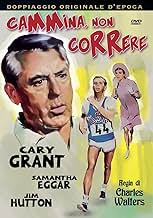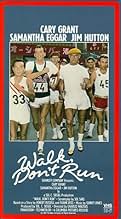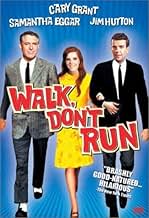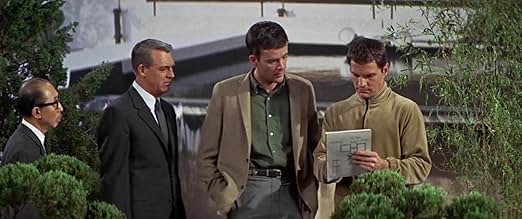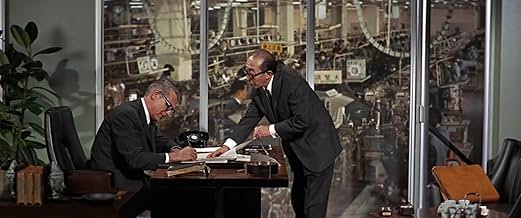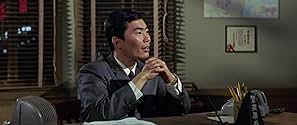IMDb RATING
6.6/10
4.9K
YOUR RATING
During the housing shortage of the Summer Olympic Games in 1964, two men and a woman share a small apartment in Tokyo, and the older man soon starts playing Cupid to the younger pair.During the housing shortage of the Summer Olympic Games in 1964, two men and a woman share a small apartment in Tokyo, and the older man soon starts playing Cupid to the younger pair.During the housing shortage of the Summer Olympic Games in 1964, two men and a woman share a small apartment in Tokyo, and the older man soon starts playing Cupid to the younger pair.
Holger Abro
- Swedish Athlete
- (uncredited)
Isabel Boniface
- Mexican Athlete
- (uncredited)
Vickey Cason
- Contortionist
- (uncredited)
David Draper
- Swedish Athlete
- (uncredited)
Terry Farnsworth
- Olympic walker
- (uncredited)
Sonja Haney
- Swedish Athlete
- (uncredited)
Sonya Harrison
- American Athlete
- (uncredited)
Featured reviews
I'm sure that Cary Grant was dangled the prospect of a nice all expenses paid for location shooting in Tokyo for his final film, Walk Don't Run. It's the reason he did the film I'm sure.
It's not a bad film to go out on, not near as good as say The Shootist was for John Wayne, but no Cuban Rebel Girl like Errol Flynn had. It's a remake of an earlier Columbia Pictures hit, The More the Merrier that starred Joel McCrea, Jean Arthur, and Charles Coburn. Coburn got a best supporting Actor Oscar for his performance and Grant has his part.
The original film dealt with a tremendous housing shortage in Washington, DC during the World War II, a crisis of four year duration as opposed to a few weeks in Tokyo where because of the Olympics of 1964 there are no hotel rooms to be had.
On a whim, visiting industrialist Cary Grant answers an ad for a room mate posted at the British Embassy by Samantha Eggar. She gets the full court Cary Grant charm and after a bit of reluctance, allows him to stay. Then Grant lends half of his half to American Olympic athlete Jim Hutton.
Eggar has a fiancé, but foxy Cary works his wiles on both Samantha and Jim. The results are obvious.
Walk Don't Run has a few funny moments, Cary Grant style, especially when Grant strips down to his underwear to talk to Hutton during Hutton's event which is the long distance walk. He also has to pry Eggar's fiancé away to get Eggar and Hutton together. John Standing is Eggar's fiancé and he puts in a droll performance as a dull predictable British civil servant.
Cary managed to mine a few more laughs out of his last screen role, but you decide if the trip was worth it.
It's not a bad film to go out on, not near as good as say The Shootist was for John Wayne, but no Cuban Rebel Girl like Errol Flynn had. It's a remake of an earlier Columbia Pictures hit, The More the Merrier that starred Joel McCrea, Jean Arthur, and Charles Coburn. Coburn got a best supporting Actor Oscar for his performance and Grant has his part.
The original film dealt with a tremendous housing shortage in Washington, DC during the World War II, a crisis of four year duration as opposed to a few weeks in Tokyo where because of the Olympics of 1964 there are no hotel rooms to be had.
On a whim, visiting industrialist Cary Grant answers an ad for a room mate posted at the British Embassy by Samantha Eggar. She gets the full court Cary Grant charm and after a bit of reluctance, allows him to stay. Then Grant lends half of his half to American Olympic athlete Jim Hutton.
Eggar has a fiancé, but foxy Cary works his wiles on both Samantha and Jim. The results are obvious.
Walk Don't Run has a few funny moments, Cary Grant style, especially when Grant strips down to his underwear to talk to Hutton during Hutton's event which is the long distance walk. He also has to pry Eggar's fiancé away to get Eggar and Hutton together. John Standing is Eggar's fiancé and he puts in a droll performance as a dull predictable British civil servant.
Cary managed to mine a few more laughs out of his last screen role, but you decide if the trip was worth it.
They don't make comedies like this anymore. It's got a bit of the mad-cap silliness of the era, as though people could be ridiculous and think it somehow made sense. God, sometimes I wish that were so. The characters bicker constantly, yet that never seems to stop them from getting along. Wouldn't it be fun if life were really like that? This film makes it seem as though it could be. It's about three westerners who share the Tokyo apartment of one of them during a short-lived housing crunch arising from the '64 Olympics. It's a very slight premise, but it serves to propel a gem of a light-hearted comedy. The humor is droll, dry, witty, and acerbic. But, there's a sense of we're-all-in-this-together that keeps the film on the fun side of the line that divides confusion from conflict. If you like "The Gilmore Girls," but would prefer a little more sedate pace, you'll love this one.
I saw this again on TV the other night, and the sad fact is that it's a very dated, formula-driven 1960s comedy that would deservedly be forgotten except for three things:
1) If you're interested in the Olympics, it offers one of the few looks at Tokyo during the 1964 games. I'm not sure if any other films use the Tokyo games as a setting. Also, it offers a glimpse at 1960s Tokyo, which apparently no longer exists.
2) He was old and graying and his material was awful, but in many ways, this film displays the magic of the great Cary Grant. He rose above lame material one more time, and without him, this would have been unwatchable.
3) I will never forget the closing line from the original TV ads for this film: "Run, don't walk to see 'Walk, Don't Run.' " They don't make them like that anymore.
1) If you're interested in the Olympics, it offers one of the few looks at Tokyo during the 1964 games. I'm not sure if any other films use the Tokyo games as a setting. Also, it offers a glimpse at 1960s Tokyo, which apparently no longer exists.
2) He was old and graying and his material was awful, but in many ways, this film displays the magic of the great Cary Grant. He rose above lame material one more time, and without him, this would have been unwatchable.
3) I will never forget the closing line from the original TV ads for this film: "Run, don't walk to see 'Walk, Don't Run.' " They don't make them like that anymore.
Cary Grant's last film is an enjoyable, albeit entirely unnecessary, remake of the classic The More The Merrier. That film starred Joel McCrea, Jean Arthur, and Charles Coburn. Grant play the Coburn role as an older man who tries to play matchmaker to a younger couple he is sharing an apartment with. The couple here are Jim Hutton and Samantha Eggar. Poor substitutes for screen legends McCrea and Arthur but both are likable. The original took place during WW2 so it used the wartime housing shortage as part of the plot. This moves things to Tokyo during the Summer Olympics in order to keep the plot intact of Grant not being able to find a room anywhere else. On the whole, it's an amusing movie but probably much less so if you've seen the original. This is pretty much a scene-for-scene remake with few changes. Grant's a rough fit for the role as it is intended but he does give it his best, using his charm and wonderful screen persona to great effect. He's certainly the best thing about the film and, at all times, my attentions were on him rather than his co-stars. Obviously I would recommend you see the classic 1943 film over this. But, if you have seen that, there's no harm in giving this one a try to see a different cast approach the same story. As far as last films of great stars goes, this could be worse. Just look at some of Grant's contemporaries and you'll see some truly sad ways to end a career. Cary wisely knew to get out while the getting was good. That's a lesson a lot of stars could still learn today.
I am a huge Cary Grant fan and in this, his final film, he is charming as usual. Jim Hutton and Samantha Eggar are very good as the victims of his matchmaking. Its predictable but who cares? Its a feel good movie and I give it ***** big stars out of 5.
Did you know
- TriviaCary Grant (Sir William Rutland) retired from acting after this movie because, at sixty-one, he had become too old to play the romantic lead. Grant, furthermore, did not think his fans would want to see him playing supporting roles.
- GoofsAt the race, Julius says the fastest time for the 50 km race-walk is "four hours and fifty-three minutes." At the time of the 1964 Olympics, the men's 50 km race-walk world record was actually 4:00:50. (At the time of the film's release, the record was 3:55:36.)
- Quotes
Christine Easton: After 7:45, you can have the bathroom all day if you'd like.
Sir William Rutland: I wouldn't know what to do in the bathroom all day!
- ConnectionsFeatured in American Masters: Cary Grant, gentleman acteur (2004)
- SoundtracksAn Affair to Remember (Our Love Affair)
(uncredited)
Music by Harry Warren
Lyrics by Harold Adamson and Leo McCarey
Sung by Cary Grant
- How long is Walk Don't Run?Powered by Alexa
Details
Box office
- Gross US & Canada
- $9,810,000
- Runtime1 hour 54 minutes
- Sound mix
- Aspect ratio
- 2.35 : 1
Contribute to this page
Suggest an edit or add missing content

Top Gap
By what name was Rien ne sert de courir (1966) officially released in India in English?
Answer


